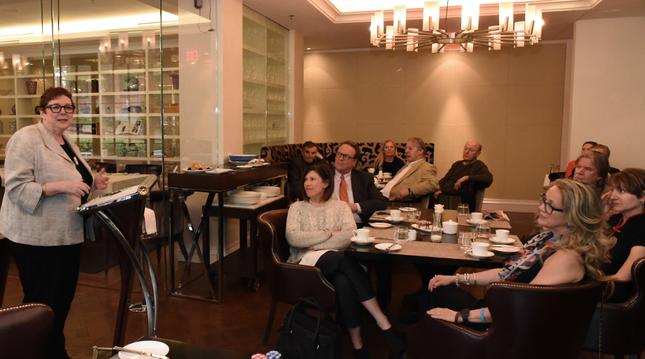Theater Leader Says Plays, Musicals Are Good for Business
By • May 20, 2016 0 1513

When the Helen Hayes Awards — complete with both Helen and Hayes Awards for the second straight year — commence at the Lincoln Theatre May 23 (after-party to follow at the 9:30 Club), it will be the first awards event under Theatre Washington’s new president and CEO Amy Austin.
Bringing a varied and intriguing background to her job, Austin spoke at the second 2016 Georgetown Media Group Cultural Leadership Breakfast of the year at the Rosewood Hotel May 5 to showcase the depth and breadth of the Washington theater scene and its importance to the city and the region.
Austin came to the job after a major stint as a newspaper publisher, as well as work with the Theatre Lab and, back in the day, working with Horizons: Theatre from a Woman’s Perspective under artistic director Leslie Jacobson.
“I actually had a role in ‘The Children’s Hour,’ ” she said. “I majored in theater at George Washington University [where she took classes from Jacobson] with a minor in political science — which seems like a perfect combination for this town.”
Horizons, incidentally, was a successful group which performed at Grace Episcopal Church in Georgetown, with memorable productions including “Top Girls,” “Eleemosynary,” and the, yes, Helen Hayes Award-winning best musical play, “My Name Is Alice.”
Austin went on to become publisher of the Washington City Paper, the city’s often controversial weekly, including during the period when Dan Snyder, the owner of the Washington Redskins, sued the paper over its coverage of him and the team. “If you want to talk about stress, that was a pretty stressful time,” she said.
Theatre Washington evolved into a broader promotional and educational organization about theater from its Helen Hayes Awards origins in 1983 — with the very active participation of its namesake, who is considered the First Lady of American Theater and who also won an Oscar.
The awards were and continue to be different from other such occasions — including the Tonys — because to this day they are a boisterous evening of celebrating Washington’s theater community, which has grown into more than 50 theaters of various sizes and different sorts of audiences and content, spreading throughout the city and the region in Virginia and Maryland.
Austin noted that there was a time when in Washington there was really no such thing as regional theater — “it was a touring town” — mostly at the National Theatre, where producers either tried out Broadway-bound shows (famously, Washington Post theatre critic Richard Coe helped “fix” “Hello Dolly,” and the rest is history) or hosted national tours. Today, the National stills does that, along with the Kennedy Center, which also hosts many touring musicals, especially in the summer.
The history of what is now theater in Washington really began with the founding of Arena Stage in 1950 by Zelda and Tom Fichandler and Tom Mangum. After starting at the Hippodrome on New York Avenue at 9th Street NW, Arena moved to its present location near the Southwest waterfront.
“Theater,” Austin said, “is first of all about a shared experience among audience members and the artists in a company, about magic and special moments that you can’t have anywhere else. At its best moments, the audience and the actors are breathing the same air. Theater is full of transformative moments.”
“Theater,” she said, “is about community and communities.” Theater, she said, can also transform communities.
“The one thing I’ve noticed about Georgetown,” she said, “is that you don’t have a theater here. I know the Kennedy Center is close, but it’s not the same.”
Austin noted the power of theater — its presence within our midst — to change the urban landscape, beginning with Arena Stage, which now stands as an example of transformation, with big changes coming to the waterfront and up and down the river.
“Look at the downtown area and what happened, how it’s changed,” she said. “The Shakespeare Theatre, the Harman stage, the Woolly Mammoth, they were the pioneers there. That was also the case for the Studio Theatre on 14th Street, which was there long before the transformation that occurred there.”
“Theater can change things dramatically,” she said. “It adds to the economy. We’ve seen it. Theater is good business. It brings in audiences from all over the region and sometimes the country. Washington is going to have a heavy influx of new people over the next few years, and they’ll make up the new audiences. They’re coming here because the cultural opportunities, including theater, are so plentiful here.
“Theater is culturally influential,” she said. “Look at what’s happened with the preponderance of ‘Hamilton.’ Everybody has the CD, and people listen to it all the time.”
“New theater happens here all the time, new plays, new playwrights. We had 59 world premieres.”
Much of that total came from the Women’s Voices Theater Festival last year, in which practically all of the theaters in the Washington region opened their seasons with brand new plays by women, a risky prospect that showed off the community’s willingness to band together.
“We hope to be able to continue this kind of thing, this cooperative effort,” Austin said. “That’s what Theatre Washington is about: to spread the word, to work with other institutions. We have a vibrant community, a vibrant theater world here.”
- Theatre Washington CEO Amy Austin spoke at Georgetown Media Group’s Cultural Leadership Breakfast at the Rosewood May 5. | Neshan H. Naltchayan



